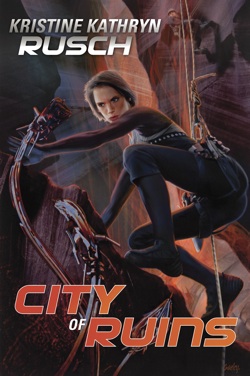One of 2009’s most pleasant surprises was Diving into the Wreck, a short but excellent SF novel by Kristine Kathryn Rusch about Boss, a specialist in the exploration of derelict spaceships. In this first novel, Boss discovered the wreck of a Dignity ship. This remnant of a legendary Fleet contained remnants of the mysterious and dangerous “stealth technology” that could possibly tip the balance of power between the Enterran Empire and a small alliance of independent planets.
In City of Ruins, the excellent follow-up to Diving into the Wreck, Boss runs a much larger operation and has become more of a manager than an explorer, but when she hears reports of mysterious deaths on a planet in the Enterran Empire—deaths that suggest the presence of stealth tech on or below the surface of that planet—she ventures into the Empire and participates actively in the attempt to track down and recover this potentially game-changing technology. What she finds there is more than she ever hoped for….
City of Ruins has just about everything that made Diving into the Wreck great, and a few extras. Returning again is the fascinating protagonist, who just goes by the name “Boss.” She’s an intensely private control freak with an empathy deficit that borders on the pathological. She’s smart and strong and dedicated, but she lives for her work first and thinks of her employees more as cogs in a machine than as actual people. Or, in her own words:
[…] I’m slowly learning, as I’m managing more and more staff, that people actually care what others think.
Much of City of Ruins is again narrated by Boss in a tight first person perspective and in the present tense, which leads to a staccato, almost choppy style. It’s not pretty or elegant, but it’s how Boss thinks and sees the world, and it immerses you completely into the action because her focus on what she’s doing is never less than laser-like. It also means that many of the book’s side-characters, especially Boss’s team members, tend to be a bit faceless and bland, because Boss mainly thinks of most of them in terms of how they can hinder or help the mission.
One of the most pleasant surprises is that part of City of Ruins is narrated by Coop, a brand new character. Revealing exactly who he is would constitute a spoiler, so I’ll let you discover it for yourself. Coop’s chapters are told in the third person and in the past tense (which makes sense, if you think about it—and that’s about as broad a hint as I’ll drop regarding his identity). He is also much more of a “people person” than Boss, and the contrast between their chapters really emphasizes how subtle Kristine Kathryn Rusch’s narration has been with Boss throughout these first two books.
Some of the most memorable scenes in Diving into the Wreck were the in-depth looks at the dangers of exploring a derelict spacecraft. There’s again plenty of this to be found in the new novel, but now the search takes place underground rather than in space, which creates an even stronger sense of claustrophobia. (It also leads Boss to wish she could turn off gravity, because unlike most people, she’s more comfortable in space than on the ground.) City of Ruins contains some extremely tense scenes and underground adventures, always told in Boss’s characteristically dispassionate tone. These scenes are definitely the most exciting parts of the novel, but they wouldn’t work nearly as well if they weren’t framed in the larger political drama that Rusch set up in the first novel and further expands in this sequel. Reading City of Ruins, you know that you’re only seeing a small part of the puzzle, but at the same time you realize that these events will have a huge effect on the wider universe.
The only real issue I had with City of Ruins is a relatively minor one: Kristine Kathryn Rusch often ends her chapters with very short, overly dramatic paragraphs, often consisting of only one sentence that echoes part of the last one. I suppose this was meant to drive home the point and create a sense of drama, but it happens so frequently that it quickly starts to get annoying. Here’s the end of Chapter 6 as a (randomly chosen) example:
I nod. For the first time, I’m enjoying this project. I’m even looking forward to the work below ground.
Maybe that’s because diving is my element, whether it’s underground or in space. Or maybe it’s because I finally believe we’ll discover something.
Stealth tech or not, there’s something here. Something old. Something interesting.
Something unexplained.
And here’s another one, from Chapter 26:
“I don’t like being underground,” Roderick says softly, speaking to me.
“I’m not fond of it myself,” I say. “But this is where we’ve chosen to work. Let’s just be smarter about it the next time we come down here.”
If there is a next time.
If we get out at all.
City of Ruins consists of over seventy short chapters, and too many of them end with an instance of this technique. It’s almost like the dun-dun-duuuun used to emphasize the Big Revelation in old thrillers, but instead done every five to ten minutes. Once I became aware of this—after the third or fourth time in almost as many chapters—it started to distract me from an otherwise very engaging reading experience.
Aside from this minor point, City of Ruins is an excellent novel that combines adventure and excitement with solid world-building and subtle narration. By the time you turn the final page, you’ll be very eager to find out where Kristine Kathryn Rusch is going to take this series next. Recommended—but make sure to read Diving into the Wreck first.
Stefan Raets reads and reviews science fiction and fantasy whenever he isn’t distracted by less important things like eating and sleeping. Many of his reviews can be found at Fantasy Literature.










